Ben Zion is the author of two books: ‘Whence Come You’ and ‘High Meridian’.
He is a father to a beautiful baby boy and partner to a loving woman. Being an identical twin, he was born into an orthodox Jewish background.
He has renounced all religious affiliations long ago, to truly explore and embrace the depths in all (or most) religions.
He has heavily resonated with the Hindu philosophy of advaita vedanta (Upanishads, Bhagavad Gita, Sutras etc) and also with the Old and the New Testaments.
He is a practising barrister and former solicitor, a scholar of the Honourable Society of the Middle Temple.
PL: First and foremost, would you mind filling us in a bit on your background?
BZ: As to how I answer this entirely depends on which background you’re referring to.
If you’re referring to my religious background, I am inclined to give a rather comprehensive answer, so please bear with me. I was born into an orthodox Jewish family, and while we were not religiously observant to any high degree, we would certainly perform weekly family gatherings on a Friday night (called Kiddush) where candles are lit to welcome in the Sabbath and a small prayer is said in a ritual involving bread and wine (most Jewish people reading this would relate to this). In addition, we would be mainly observant of all (or most) festivals, whether that would be preparing the house for Passover and gathering round as a family for the seder table, or eating a family meal in a hut (called a sukkah) erected by my father outside the house during the festival of Sukkot, or getting dressed up and a little merry during the festival of Purim, or sitting down with the family for a meal during Rosh Hashanah (the Jewish New Year), or fasting for 25 hours for the holiest day of the year (Yom Kippur).
I have fond memories of all of these times, not so much religiously, but familiarly.
However, the religion and I parted ways many years ago, especially regarding ritualistic observance, when I began questioning both the significance and the need to perform certain behaviours without there being any seemingly sound basis for doing so. I entered into numerous debates (some even heated) with rabbis over the years, who in response to my ever-persistent probing tended to leave the debate with the parting phrase “because Hashem (God) told us to, that’s why!”. Was I to just accept this, like a sheep in a flock?
I recall one debate (of many) over the laws of Kashrut (dietary laws) particularly concerning the mixing of milk and meat. Many a Friday evening we would have a chicken meal, but could not have any dairy products containing milk in the same sitting, and we were told to wait six hours between eating anything containing milk and eating chicken. I was lost as to why this was the case – many around me just wanted to observe this custom without questioning it. Not me – it’s not in my nature to simply accept anything without questioning it. So, being the rather investigative cross-examiner that I am (no wonder I became a barrister) I entered into deep discussion with a community rabbi (one who was recognised as an expert on Kashrut):
– I was told that this law originally stems from the Book of Exodus 23:19 which appears as a commandment “thou shalt not cook a kid in its mother’s milk” – ‘kid’ in this context relating to an infant goat.
– The rabbi explained to me that this original law had been subjected to much interpretation over the past few thousand years, first extending its meaning to any milk of a goat, and not just that of the kid’s mother.
– Then later it was interpreted to mean that no kid whatsoever can be cooked in milk.
– Then later still it was interpreted to mean that no meat can appear on the same plate or vicinity as milk.
– Then more recently, time periods have been imposed on the orthodox Jewish community (no doubt varying between customs and sects) between eating milk and meat, which as far as I can recall was about 6 hours as a gestation period.
Nowadays a religious orthodox Jewish family would have different plates and cutlery for milk or meat, and many even have two sinks to perform the same separation. In addition, I have heard of plates and cutlery being buried in the garden if there ever happened to be cross contamination, although I am not sure how widespread this practice is around the world.
I then asked the rabbi why chicken was not allowed with milk; it being classed as ‘bird’ and not ‘meat’. The rabbi told me of a story of a Jewish community in Eastern Europe in or around the seventeenth or eighteenth century (my dates may be a little off) whereby the rabbi of that community was approached by a woman who was preparing for the Sabbath meal, and posed a question whether chicken (being classed as bird, not meat) can be cooked and/or eaten with milk. It was relayed to me that this rabbi told the woman that she was to consider chicken as meat for the purposes of this law under Exodus 23:19… and so it went…. and so, it still goes.
Now, whether or not the above tale is entirely accurate as conveyed to me by this particular rabbi is somewhat secondary to the primary take-away for me being that this was but one of a plethora of examples where man-made law was being treated as the word of God, and transgression of the same would be deemed as sinful. This for me is a classic example of where something written thousands of years ago within an ancient text (such as the Book of Exodus 23:19) has been subjected to over-interpretation, and now what is nothing more than the peak of a man-made mountain of reclarification has been given Divine status.
It took me years to be rid of this sort of conditioning that had originally been drilled into me – not to eat shellfish, pig, milk and meat, certain types of fruit, certain fish – the list goes on. It was only when I started to become aware of these layers of entrenched conditioning that I was able to let go of them.
In addition, I would no longer refer to myself as a “Jew” per se, but more as one who was born into a Jewish family. This allowed for a separation between the idea I had of myself and that of the Jewish religion. The problem made by many with a belief structure is that they place their own identity within that belief structure, and at any point they start removing the bricks from the foundations of a belief they consider their own identity to be likewise under the same threat of collapse. And so, just as Moses pleaded with his Pharoah to “let his people go”, I too from an identity standpoint had to do the same.
PL: That answer is both fascinating and enlightening. It certainly demonstrates your curious nature, and desire for the truth.
With that in mind, what inspired you to write “Whence Come You” and “High Meridian”?
BZ: Whence Come You was written in seven weeks following the first lockdown. I wrote it as a result of being approached by many people at the time who were longing for engagement in esoteric masonry, and had asked me which literature to obtain to assist them in their quest. I had the usual go to references, such as Wilmshurst and Eckartshausen, but I got the impression that many current seekers had found such writings to be not only unrelatable but difficult to get through. They found more benefit from the interactions they had with me during a live weekly Zoom meeting than within the books I was recommending to them.
Some of the feedback I received from those who had attempted to read such literature was that while such writings were deep, and did resonate with them to a large degree, there was little to nothing within such writings guided them to any true awakening experience. In addition, there was nothing they could find that was both esoterically deep and contemporary – most of such literature was written over a century ago.
I therefore decided to write from the first-person singular, which is something that was almost never seen in esoteric Masonic writings, and in so doing I was able to set out a personal journey of awakening, which I hoped would be both stimulating and helpful to the seeking Mason. The main purpose of the book being twofold – to assist with the deepening of conscious focus, as well as enabling the reader to effect necessary perspective shifts to allow a greater understanding of both the Masonic ritual and of himself.
Following its critical acclaim, many were asking me if I was going to write a sequel. I had, truth be told, already started putting pen to paper a year or so prior to releasing Whence Come You, and so High Meridian had in total been two years in the making. I think anyone who has read both books will agree that High Meridian is the more mature of the two, and this was purposely designed as so. It is meant to parallel somewhat the progression from the First to the Second Degree in Masonry; for Whence Come You is lighter, almost childlike in spiritual purity, whereas High Meridian is notably larger, heavier and more intellectually complex than its predecessor.
PL: I can see that comparison somewhat between the two books, but ‘Whence Come You’ demonstrated – as one reviewer put it – that you ‘write courageously’; your openness and honesty is powerful. It is a great primer for the ‘More Light’ series.
In my review of ‘High Meridian’, I mentioned that I had to reread sections several times, not because I didn’t understand them, but that suddenly I did. The book makes you read things again and again, to allow the premise and wisdom to sink in. I read it, digested it, and then found another layer behind it.
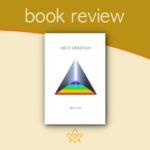
Book Review – High Meridian
Ben Zion’s awaited second book – This book contains a highly thought-provoking, or perhaps, more crucially a challenging narrative on the esoteric aspects of Freemasonry. There is no cautious conjecture, no frivolous ‘woo-woo’ approach, Zion dives straight in and makes us think…hard!
more….
It reminds me of the concept that Freemasonry is like an onion – there are so many layers. I found both books very ‘conversational’ and easy to read; what was harder for me, was digesting the things I already thought I knew. You have a remarkable talent for unpeeling the Masonic ‘onion’. Just when we think we’ve uncovered our personal mysteries, you take off another layer.
Your understanding, evaluation and conveyance of the symbolism and psychology of Freemasonry is deep, is that something you have always been able to do, to think critically and expound upon it?
BZ: It’s kind of you to say, and I’m just so glad that my writings have resonated so deeply with you. As far as I can recall, I was incapable of thinking this way throughout my teens and twenties, but as for whether this ability had always been with me, lying in a state of dormancy until its eruption in my thirties, is hard to say.
What I can tell you is that I have always had a keen eye for detail, and I have always been very inquisitive. I have never accepted an answer to any question as representing the whole truth – I would always probe further, to the annoyance of many members of my family. I also think my legal training has played a large part in my ability to play fluidically with Masonic concepts. A big part of my job is to creatively interpret the law to fit a client’s narrative – I guess that is why I put less weight on any one meaning, because all interpretations are true depending on one’s perspective.
In my thirties I spent many years in deep contemplation, daily meditation (meditative self-enquiry/Advaita Vedanta) and daily Masonic study. This led to an awakening experience when in my mid-thirties, which would possibly take too long to go into here, although you may recall that I have explained about this in Chapter 3 of Whence Come You – I call it my “Damascus moment” – in short, I was able to just become aware of my thoughts without otherwise engaging with them. This was admittedly an immediate and profound shift for me, but the opening up to deeper realities and further insights was more of a gradual one, and happened over the course of about eight years.
I eventually found answers, and I mean answers to some of the BIG questions – who am I, where am I, what is my purpose… and from there I became existentially aware of the threefold nature of being. Re-discovery of this threefold nature was assisted (in part) by regular meditation upon the Masonic ritual and its various symbolism. In fact, the symbols did the most for me – I realised that they are in fact contemplative aids capable of unlocking their timeless secrets when the right time comes – almost as though each symbol has its own personality and chooses when to reveal itself to the faithful seeker. That of course is not really how things go, it is in fact the soul that chooses when and how something is revealed. Oh, I can still recall the brilliance of the light that infused the soul upon arrival of each revelation.
The problem with having seen much light, however, is that it becomes the only thing to be seen thereafter, and has the result of making everything else look dark by comparison – much like when we look at the Sun, the light that imprints on our retina is all we can see as an afterimage, until it eventually fades away.
This becomes problematic for the Soul, and unbeknownst to the seeker, ego creeps in… just like the arrogance of the Entered Apprentice who proceeds to the Second Degree believing that he is no longer in a state of darkness, so too was I absolutely sure that the answers I had discovered held objective status… I believed I had found THE answer to many Masonic questions. Having spoken with many seekers over the years, and seen their development, it appears to be a common stage all seekers go through. They fall in love with their own discovered truths, to the extent that they become blinded by them, and hence blind to the beauty of any other.
It was only some years later that I was capable of embracing another’s view, another’s perspective, another’s thought process…
‘Where am I going with all of this?’ you may wonder. While meditation, contemplation and daily study are imperative, the main trick to being able to see further than most in relation to Masonic symbolism and allegory, is to steadfastly refuse to accept anything at face value… always go deeper, and even when you think you’ve gone deep enough, keep digging.
As explained, the common mistake of many a seeking Mason is to upgrade the status of his own discovered truth to THE TRUTH. To move from subjective to objective is a retrograde step – for who has more chance of growth, the one who knows he knows nothing at all, or the one who thinks he knows everything?
PL: To many Masons, the esoteric – or spiritual – aspects of Freemasonry are a big thing, and there are some very important parallels between ancient and modern traditions within the teachings. To quote the blurb on ‘Whence Come You’ – you ‘interweave the fundamental principles of the Eastern school of Hindu Philosophy (Advaita Vedanta) with Judeo/Christian mysticism, finding synergy between the two worlds and showing us all along that there is embedded within all religions but one Truth, one origin, and one destination’. Could you tell us a bit more about that here?
BZ: I again go back to the discovery of the threefold nature of reality – this philosophy seems to underpin all major religions, even though their superficial veneers appear wildly different.
For example:
In Hinduism, they have Brahma, Vishnu, Shiva
In Christianity, they have The Holy Trinity (Holy Spirit, the Father, the Son) and this notion is repeated throughout the New Testament: “In the beginning was the Word, and the Word was with God, and the Word was God”
In ancient Egyptian mythology, they had Osiris, Isis, Horus…
In the Old Testament there are numerous threefold models:
– God, Adam, Eve
– God, Abel, Cain
– Abraham, Sarah, Ishamael/Isaac
– Isaac, Esau, Jacob
In ancient Greek, this threefold nature appeared on many different occasions, one such example is when Prometheus stole fire from the gods at mount Olympia and brought it down for Mankind’s use – in this tripartite model are Zeus, Prometheus, and Man.
In Ancient Rome, the story of the twins Romulus and Remus seems to impart this threefold message – there is the Wolf that nurtured them, Remus (who was slain), and Romulus (who rose above his brother – giving rise to name of Rome)
Also, central to many of these stories is the notion of a refused birth right – Remus and Romulus, Abel and Cain, Esau and Jacob, Osiris and Set (i.e. Osiris’ murder and dethronement by his brother Set) …the list goes on.
PL: One of the great things about Freemasonry and its teachings, is the assimilation of so many universal traditions. This is of course reflected and entrenched in the tenet of Brotherly Love and the acceptance into the Fraternity of brethren from all religions. The great thing about Freemasonry is that everyone can find something they relate to within the fraternity – whether that is self-improvement, the social and/or charitable aspects, or the deeper mysteries – however, like many, I tend to feel that if you disregard the mysteries, you are just left with a bit of an elite social dining club that raises money for charity. I know there’s more to it than that but I’m playing devil’s advocate here! What are your thoughts on the importance for Masons to understand the hidden mysteries i.e., not throwing the esoteric baby out with the bathwater?
BZ: Forgive my directness here, but any person who joins a Masonic Lodge, partakes in the ritual, wears the Masonic garb, undertakes every primary office in the Lodge, becomes Worshipful Master, gets provincial honours (or even higher still), and has not once enquired into the meaning of the ritual and even refuses to do so is (in my humble opinion) not a Mason. In fact, they are not even close to being a Mason. To be a Mason, in the truest sense, one must first be properly prepared to embark upon the journey of Self-discovery, to look within and to seek for one’ existential origin – and so being a seeker must therefore be a pre-requisite.
Sure, they can call themselves Masons, but they are Masons in name only, for if they disregard the mysteries, what do they have left? A boy’s club? Amateur dramatics? Such people are not seeking, and so were not properly prepared to enter into the Lodge in the First Degree to begin with.
Agreed, camaraderie and charity are both major and important aspects of a Masonic experience, and to the select few even elite dining means a lot to them… But camaraderie and elite dining can be done outside of Masonry, and in fact play no part inside the Lodge room during any work of a ceremonial nature.
As for charity, it need not be monetary in nature, although a lot of good has come from the Masonic Charities funds. In fact, going further, I would postulate that charity in a Masonic context is not meant to be monetary at all, but rather the giving of oneself “freely” – I recommend all revisit the ritual of the North East Corner in the First Degree. The phrase “to give freely” is a play on words – the full line being “if you had not been so deprived, would you have given freely”. This speaks to me on a level quite apart from the grubby realities of money or money’s worth – Masons are meant to level themselves with one another. The Mason with no money must give charity as equally as the Mason with money – how can this charge be complied with by the one who is financially destitute? We must not forget that whatever occurs within a Lodge room and/or ceremony, is symbolically representative of what is happening within the soul. We are meant to leave all money and metal outside the door of the Lodge, and thus, the request for charity within the Lodge cannot in my view relate to charity of a monetary kind, but rather the giving of one’s heart to another in time of need.
As to your question relating to ‘the importance of Masons to understand the hidden mysteries’, I guess it depends as to whom you are referring as “Masons” – if by Masons you mean those who are Masons in name only and neither seek nor wish to seek, then no I would suggest that the hidden mysteries hold no importance for them. If by “Masons” you mean true Masons, then they will already be engaged with trying to understand the hidden mysteries.
PL: Ok, I’m going to get personal, and probably a bit controversial here. I left the women’s Masonic Order I was in because it was disappointing. Freemasonry itself wasn’t (isn’t) disappointing, but the presentation of the ritual in that lodge most definitely was. I won’t go into details – although it is a good dinner party story – but to be frank, the ritual was embarrassing. Don’t get me wrong, the women were lovely, but it completely lacked any substance and spirit, and worse, was a bit of a farcical performance. It also seemed as if the ritual came a very poor second to the social and fundraising side of things; I felt as if I would have achieved the same at the WI. Now, maybe that is all my problem, I’m perfectly willing to accept that. I’m not a ‘group’ person and I did have my reservations about joining a fraternity. Having been almost an ‘honorary’ Freemason due to many years of association with Masons, combined with my work in Masonic publishing, plus the books I’d written on the subject, I thought it would be a good idea and I wanted to experience the ritual myself.
But I’m skirting around the question I really want to pose: if you are ‘first made a Mason…in your heart’, is it possible to be a ‘solitary’ Mason? I know that goes completely against the ethos of a fraternity, but do you think it could be a ‘thing’? That by studying and absorbing the knowledge, we can use the teachings of Freemasonry as an individual, without the necessity to go to meetings, or be part of that centralised hierarchy?
BZ: Firstly, the word “fraternity” means brotherhood, and thus as brothers all are meant to share the same parental lineage. To be a ‘solitary’ Mason, as you have put it, is not against the ethos of Masonry – in fact, far from it. While belonging to a Masonic Lodge has its advantages, especially from a cooperative learning experience, the path is ultimately a solitary one – only you can walk it, and it can only be walked alone. I am not suggesting that this perpetuates the notion of separation or division, merely that the spiritual path is a lonely one, until the perspective of Oneness arrives, at which point (as the Buddhists proclaim) there becomes an increasing sense of absolute intimacy with the 10000 things.
Secondly, I am truly very sorry that you have had this experience in the women’s Masonic Order – having never attended a Masonic meeting at a woman’s Masonic Lodge I cannot comment from personal experience. However, what you describe is greatly paralleled by the disappointment I have had with the organisation. I too remain a Mason but unaffiliated (that is, without being a member of any particular Lodge). I left my own Lodge which had been in my family for over four generations due to a disagreement with a number of senior Past Masters who wished to put into action a plan that was hatched by a fearmongering Past Master at the cost of ensuring adherence to both the Book of Constitutions and Masonic principles. In order to safeguard against constitutional transgression, I took this issue up with the governing Province who took a wilfully hoodwinked stance as to Masonic compliance, and found nothing to see. I then exercised my right to appeal under rule 185 and took the decision of the Province to an Appeals Commission sitting at Grand Lodge. At the appeal I saw first-hand how the Masonic elite have the power to brazenly interpret the rule book in order to fit their own narrative.
By virtue of paragraph 10 of the Summary of the Antient Charges and Regulations which every Master Elect submits to and promises to support, are we not meant to “strictly adhere to every edict of Grand Lodge?”. Moreover, “every Master Elect, before being placed in the Chair, shall solemnly pledge himself to preserve the Landmarks of the Order, to observe the antient usages and established customs, and strictly to enforce them within his own Lodge”. Having done this to the best of my ability as a) a Brother who was in distress, b) a Brother fighting on behalf of at least six others in my Lodge, and c) a Brother who was strictly trying to enforce the Landmarks of the Order, I was chastised for it and hung out to dry by those in positions of authority whose job it was to both prevent corruption and assist in bringing order to a state of chaos.
There is no doubt about it, Freemasonry is beautiful both in principle and ceremonial, but the organisation within which it is currently being held is (I’m afraid to say) in desperate need of reform. I do apologise to anyone who might find my words a little jarring, particularly those who have gone through the honours system and reached high positions of authority, but this has indeed been my experience over the last couple of years. Just to clarify, I am in no way suggesting that all those in positions of authority would adopt the same cavalier approach as I have been faced with when determining Constitutional compliance, and I trust at least some of those reading this would sit up and notice that there is indeed a big problem within the fraternity, especially as it seems nowadays to be more of an honours based system at the expense of any true Masonic learning or reinforcement of Masonic principles. Lest we forget the words from our Solemn Obligation in the First Degree – “this worshipful/warranted Lodge/or society of men, who prize honour and virtue above the external advantages of rank and fortune”.
I, like you, practice my Masonry remotely – there is in fact no need to be a part of a Masonic Lodge in order to practice one’s Masonry. Physical attendance may be somewhat necessary for exposure to the ritual and ceremonial, and to see the Lodge from various perspectives (i.e., while undertaking the duties of various offices) – but the real work in my view starts when one truly speculates upon the ritual. Having had exposure for many years to the workings of a Masonic Lodge, I can vouch that this assists greatly with the exercise of speculation, but physical attendance for me was only a necessary preparative. Great strides can be made without needing to step foot back inside a Masonic Lodge.
I do however wish to caveat the above with the sentiment that if one is a member of a Masonic Lodge where the Brethren are true to one another and sincerely apply and enforce Masonic principles to the letter, then that is a wonderful gift and MUST be cherished – Sadly, I have felt the bitterly cold interior of a superficially warm hand, and so while Pandora’s jar has already been opened, I sit in hope that things can still change.
PL: Following on from that in a way: Freemasonry in the 21st century – do you feel, like many others, that it has lost its shine? I personally think it has the potential to have a bit of a renaissance, especially with the concept of Meta-Masonry. The idea of meeting in a virtual lodge is really appealing to me and I know would appeal to those with disabilities. There are a few very big barriers for me personally attending a physical lodge. Not only am I mobility disabled, due to a rare neurological disorder but I also have associated severe hearing loss. It was getting hard, really exhausting, for me to get to the meetings in London – it’s really not an accessible city. In addition, most lodges only conform to the very basics of disability adjustments. So, I think a radical solution for a lot of people, not only those with disabilities but also with financial or time constraints, would be the creation of ‘meta-lodges’. I like the idea of being able to ‘meet’ with Masons from all over the world in one place. What are your thoughts on the concept of making Freemasonry more accessible to all by opening it up to the digital age?
BZ: Yet again we seem to be speaking the same language. I have long been a strong proponent of Zoom meetings for like-minded Brethren around the world. I have led a weekly Zoom meeting for seeking Masons since the start of the pandemic in March 2020, and it proves very useful for esoterically minded individuals engaged with the existential questions “Whence do I come? Whither directing my steps?”. Nonetheless, I have seen first hand how the suggestion of digital meetings in place of certain in-person ones can be shunned by members of a Lodge, especially of the more senior end. I think such resistance is inevitable, because digitised meetings may seem somewhat too revolutionary for an age-old system that has met in person since the dawn of its conception.
I do however see a change coming, especially with technology being embraced by more and more around the world. Certain organisations such as Sapere Aude and Masonic Circle 2021 have embraced the use of video platforms to hold regular presentations on various topics of interest. I have given quite a few presentations to both organisations, and I shall be delivering my next presentation to the Masonic Circle 2021 on 29 March 2023 on the topic of Communication (where I shall be reading out Chapter Four of High Meridian).
PL: I’m hoping you are going to write at least one other book, any news on that front?
BZ: I do feel that I have at least another book in me. I also suppose it depends on the success of High Meridian and the demand for something more. Those who have read the book so far are eager to read a further book in the series – if there should be a growing wish, then I am inclined to write a third one at least, which would be aligned with that of the Third Degree, but as for timescales, due to family and work commitments it may be a year or two before it will be released.
The main headache is finding the right title – because for me, the label for any piece of work is just as important as its content – I feel it should encapsulate in concision that which is enclosed in comprehension.
PL: Thanks so much for sharing your thoughts and experiences with us, Ben. I feel we’ve only just scratched the surface of what we could discuss, hopefully we can continue and expand upon this conversation in the future.
Article by: Philippa Lee. Editor

Philippa Lee (writes as Philippa Faulks) is the author of eight books, an editor and researcher.
Philippa was initiated into the Honourable Fraternity of Ancient Freemasons (HFAF) in 2014.
Her specialism is ancient Egypt, Freemasonry, comparative religions and social history. She has several books in progress on the subject of ancient and modern Egypt. Selection of Books Online at Amazon

Whence Come You
By: Ben Zion
Esotericism and spirituality are two words seldom referred to about Freemasonry, and it is even more rare to find a book dedicated to this purpose.
This is such a book.
Ben Zion takes the reader on a personal journey of self-discovery, describing with the help of Masonic imagery and symbolism how any Mason, if earnest in his intentions and pure of heart, can become awakened by contemplation and true speculation upon the ritual, with a particular emphasis on shifting one’s conscious perspective.
In addition, throughout this book he interweaves the fundamental principles of the Eastern school of Hindu Philosophy (Advaita Vedanta) with Judeo/Christian mysticism, finding synergy between the two worlds and showing us all along that there is embedded within all religions but one Truth, one origin, and one destination.
Upon finishing this book, the reader will be instilled with a wealth of new understanding, not only about the mysteries underpinning the Craft ritual, but about himself as a man, a Mason, and a once lost soul seeking return to his Native Land.
This book is a must read for all Masons worldwide, and highly recommended for anyone wanting to embark upon a journey of self-discovery.

High Meridian
By: Ben Zion
The eagerly anticipated sequel to the best-selling esoteric Masonic book of 2021 – Whence Come You.
This book takes the reader to that next stage in a seeker’s journey, and using Masonic imagery and symbolism as a necessary backdrop against which a deeper spiritual understanding can be found, Ben Zion guides one through a spiritual labyrinth of some of the more hidden mysteries of Nature and Science.
This work offers an invaluable resource for those seeking an in-depth and explorative esoteric enquiry into concepts such as Reality, Mind, Soul, Duality/Non-Duality, the Fall of Man, Communication, Life, Light, Sound, the Meridian, Time, Verticals, Horizontals, Squares, Knowledge… and much more!
Ben Zion also takes us around the world, quarrying for spiritual wealth that has long been unexcavated yet unmistakably embedded within much classical literature; firstly he takes us to Scandinavia (Odin, Mimir, Gungnir and Yggdrasil), then to India(Ganesha in the transcription of the Mahabharata), and from there travels to ancient Greece (Pandora, Medusa, Zeus, Echo, Narcissus, Prometheus, Epimetheus, Athena, Mentor etc.), and finally settles in the Middle East exploring the hidden meanings of Judeo-Christian parables (Cain, Abel, Isaac, Rebekah, Jacob, Esau, Adam, Eve, Tower of Babel etc.)…
This book is not only a must for any seeker’s library, but a guide for greater Self-discovery!
Recent Articles: in meet the author series
 Meet The Author - Albert Mackey As a contributor to the literature and science of Freemasonry, Doctor Mackey's labours have been more extensive than those of any other in America or in Europe. |
 Philippa Lee talks Masonry and metaphysics with Ben Zion, the author of two must-have books on esoteric Freemasonry. |
 Meet The Author - Robert Freke Gould A brief look at his life, Gould was a soldier, barrister and prominent Freemason and Masonic historian. He was also one of the founders of Quatuor Coronati Lodge in 1886 |
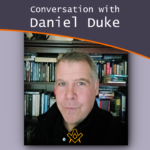 In Conversation with…Daniel Duke Author Daniel Duke talks to Philippa Lee about his new book 'Secret History of the Wild, Wild West' the third in a series on Outlaws, secret societies and hidden treasure. Dan is the great-great grandson of the infamous Jesse James, and the definitive authority on the subject. |
 Mike's Masonic Walks and Talks Mike Neville offers walks and talks primarily around London, based on his vast knowledge of the area and his specialist subjects, which cover all aspects of Masonic history, and some unique insight into the more shady side of 'Crime and the Craft'. |
 Darren Lorente-Bull is the author of 'The Other Brotherhood: When Freemasonry Crossed the English Channel' and five other books. Here he talks to Philippa Lee about his beliefs, his Freemasonry, and books. |
 Meet The Author - Angel Millar This month I am delighted to interview Angel Millar – author of five books on Freemasonry, esotericism, and world spiritual and initiatory traditions. |
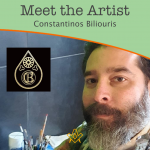 Constantinos Biliouris is a Greek Artist and brother from the Grand Lodge of Greece who creates a range of hand painted masonic aprons. |
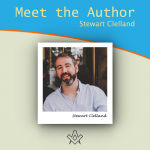 This month Editor Philippa Lee meets Stewart Clelland the author / translator of The Green Book of The Élus Coëns |
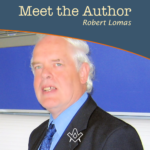 Editor Philippa Lee interviews well-known Masonic author Dr Robert Lomas |
 This month we feature ten of our recommended Masonic authors ranging from the early 1900s to the modern day, and we offer our 'Square choice' of their books. |
 We talk with ‘Brother Hogarth’ who is currently writing a series of articles featuring the Masonic art of William Hogarth. |
 If you would like your work to be featured in The Square, please take a look at our submissions guidelines and send any ideas or contributions to the Editor for our consideration. |
 A slight deviation from our usual 'Meet the Author' theme but equally as interesting, we have a 'Portrait of an Artist' - Travis Simpkins - the man capturing the likeness of Freemasons worldwide! |
 This month we Meet the Author: historian and biographer Kevin Shillington. |
 This month in 'Meet the Author' we look at the life and work of Carl H. Claudy, a prolific Masonic author who believed that Masonic education is the foundation for the Fraternity. |
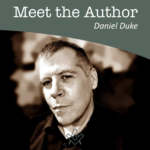 Daniel Duke, the great-great grandson of Jesse James, grew up surrounded by stories of lost outlaw treasures. |
 Stephen Dafoe - numerous books on the Knights Templar, and Morgan: The Scandal That Shook Freemasonry. |
 Paul Sparks – author of A Guide for the Masonic Treasurer |
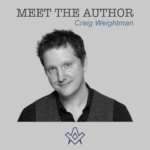 Craig Weightman – author of A Journey in Stone |
masonic knowledge
to be a better citizen of the world
share the square with two brothers

click image to open email app on mobile device









